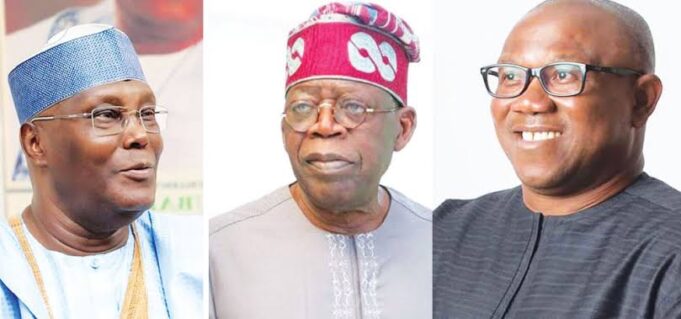Nigerians, on Saturday, vote for a successor of President Muhammadu Buhari in a tightly fought race dominated by three political veterans.
The Independent National Electoral Commission (INEC) had declared that 87,209,007 Permanent Voter Cards (PVCs), representing 93.3 per cent, were collected ahead of Saturday’s general election.
INEC disclosed that 6,259,229 PVCs, representing 6.7 per cent, were uncollected.
For the first time in Nigeria’s modern history, a third candidate has emerged to challenge the ruling All Progressives Congress (APC) and the main opposition Peoples Democratic Party (PDP).
With Buhari stepping down after two terms in office, the APC’s Bola Tinubu, 70, a former governor of Lagos State and political kingmaker, said “It’s my turn” for the presidency.
He faces a familiar rival – PDP presidential candidate and former Vice President Atiku Abubakar, 76, who is on his sixth bid for the much-coveted seat in Aso Rock.
But the emergence of a surprise third candidate appealing to young voters, Labour Party’s Peter Obi, aged 61, has thrown the race open for the first time since the end of military rule in 1999.
Nearly 10 million new voters registered this year, most of them under 34, representing an important bloc if they come out to vote.
Voters will also cast their vote for the National Assembly (Senate and House of Representatives).
“It is not as easy to predict as before.
“It’s difficult for us to make an easy prediction as to what is going to be the likely outcome,” Kano State College public affairs lecturer, Kabiru Sufi, said.
Cash and fuel shortages in the days before the election have also left many Nigerians angry and struggling more than usual in a country already hit by more than 20 percent inflation.
“This coming government should try and correct all the wrongs that this administration and other administrations have made.
READ ALSO: INEC: Voters on queue’ll vote if voting goes beyond closing time
“That is why this election is very important for whoever we decide to choose,” a 37-year-old vendor in Lagos, Blessing Asabe, said.
To win the presidency, a candidate must get the most votes, but also win 25 per cent in two-thirds of Nigeria’s 36 states.
If no candidate wins, a runoff will take place between the two frontrunners, an unprecedented outcome that some analysts say is a possibility this time around.
The rules reflect a country almost equally split between the mostly Muslim (North) and predominantly Christian (South), and with three main ethnic groups across regions: Yoruba in South-West, Hausa/Fulani in the North, and Igbo in the South-East.
The presidential elections have in the past often been marked by violence, ethnic tensions, vote-buying, and clashes between supporters of rival parties.
Voting also often falls along ethnic and religious lines.
This time, Tinubu is a southern Yoruba Muslim, Atiku is an ethnic Fulani Muslim from the North-East, and Peter Obi is a Christian Igbo from the South-East.
In 2019, hours before polls opened, INEC postponed the election by a week because of problems delivering election materials.
Today, most experts see INEC as being more prepared.
READ ALSO: INEC: BVAS won’t fail Nigerians in 2023 elections
It has introduced biometric voter IDs to help prevent fraud and results will be transmitted electronically.
About 400,000 police and troops will be deployed around the country to protect the vote.
The electoral umpire said voting will commence at 8:30 a.m. and end at 2:30 p.m. on Saturday, adding that it has established a Situation Room at the National Collation Centre in Abuja.
INEC has given no timeline for results, but votes are expected to be tallied within a few days.
Under a 2022 law, the official results have to be confirmed within 14 days of the ballot.
If a runoff is declared, the vote has to take place within 21 days.
- EPL fixtures: Aston Villa host Man City as Liverpool face Tottenham - December 20, 2024
- Report: U.S. deported 270,000 migrants in one year - December 20, 2024
- Spurs host Liverpool as Arsenal face Newcastle in Carabao Cup semi-finals - December 20, 2024










